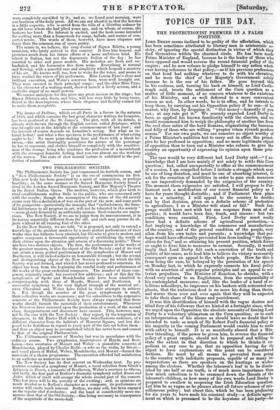TWO PHILHARMONIC SOCIETIES.
The Philharmonic-Society has just commenced its fortieth season, and a "New Philharmonic Society" is on the eve of commencing its first. This new body has been generated by a spirit of competition, or perhaps hostility ; in the same manner as the Sacred Harmonic Society found a rival in the London Sacred Harmonic Society, and Her Majesty's Theatre in the Royal Italian Opera. The motives, however, which give birth to rival establishments matter little to the public, who are concerned only -with the results ; though the assumption of the name of the old society seems very like a declaration of war on the part of the new, and some parts of its prospectus—particularly the inuendo, that "exclusiveness, the bane- ful hinderance to all progress in art, will not be tolerated in this society" —seem plainly dictated by an unfriendly animus. Such remarks are ungra- cious. The New Society, if we are to judge from its announcement., is in its nature essentially different from the old, and each may pursue its oh- jets without at all running foul of the other.
In the New Society, we are told, "it is proposed, not only to extend a knowledge of the greatest masters by a more perfect performance of their Works than has hitherto been attained, but likewise to give to modern and native composers a favourable opportunity of establishing the worth of their claims upon the attention and esteem of a discerning public." There are here two distinct objects. The first, the performance of the works of the greatest masters, is also the object of the Old Society ; and if its rival can attain a more perfect performance of the symphonies of Mozart and Beethoven, it will indeed achieve an honourable triumph ; but the second and distinguishing object of the New Society is one for which the Old Society was not formed, and which it has never professed to entertain. Its object has been from the beginning the careful study and performance of the works of the great orchestral composers. The number of these com- posers, originally small, has received few additions ; and at this day the symphonies of Spohr and Mendelssohn only have been admitted to * companionship with those of Haydn, Mozart, and Beethoven. A successful symphony is the very highest triumph of the musical art ; even Cherubini and Weber have failed in their attempts to achieve it. But though the number of the great symphonists is small, their collective works are numerous ; and the subscribers to the expensive concerts of the Philharmonic Society have always expected that those works should furnish the materials of their entertainment. Whenever the Directors have ventured upon the production of a work of the second class, disappointment and discontent have ensued. This, however, may not be the case with the New Society : they expect, by the temptation of cheapness, to fill Exeter Hall with a large miscellaneous audience, of a different character from the habitues of Hanover Square, and less dis- posed to be fastidious in regard to every part of the fare set before them : and thus an object may be accomplished which has never been and cannot be that of the original Philharmonic. The Philharmonic concert of Monday last was in accordance with the
'ordinary course.- symphonies, masterpieces of Haydn and Beet- hoven—two ovetures of Mozart and Weber—a pianoforte concerto of Mendelssohn, played by Charles Halle—a solo on the violin, by Sivori- and vocal pieces of Mehul, Weber, Mendelssohn, and Mozart—formed the Materials of a choice programme. The execution afforded full satisfaction to an audience as numerous as usual.
The New Society has its first concert on Wednesday next. Its pro- gramme consists of a symphony of Mozart, a vocal selection from Cluck's Iphigenia in Tauris, a concerto of Beethoven, Weber's overture to Oberon, and lastly, the first part of Berlioz's dramatic symphony called Borneo and Juliet, which of itself will.occupy the whole second part of the concert. This last piece will be the novelty of the evening; and, as opinions are much divided as to Berlioz's character as a composer, its performance of course will excite much interest. Berlioz, we may add, has been engaged as the regular chef d'orehestre ; and the band is considerably more nu- merous than that of the Old Society,--this being necessary in consequence of the magnitude of the music-ha


























 Previous page
Previous page